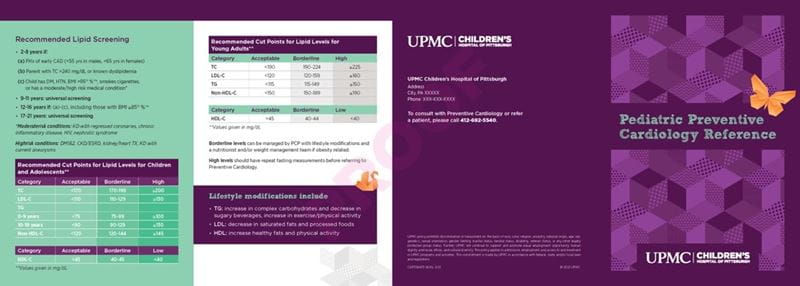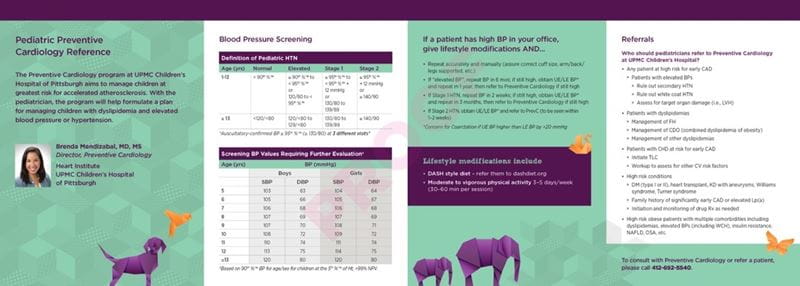Password Reset
Forgot your password? Enter the email address you used to create your account to initiate a password reset.
Forgot your password? Enter the email address you used to create your account to initiate a password reset.
3 Minutes
Pediatric preventive cardiology is a small field but with ever-increasing importance as rates of hypertension and dyslipidemia in children rise in the United States.
Brenda Mendizabal, MD, MS, is the director of the Pediatric Preventive Cardiology program at the Heart Institute at UPMC Children's Hospital of Pittsburgh. She treats young children and adolescents with elevated blood pressure, hypertension, and dyslipidemia. This covers a range of patients with genetic predispositions, those at increased risk for cardiovascular disease from congenital heart conditions or heart transplantation, and individuals with multiple co-morbid conditions that can influence blood pressure and cholesterol levels, such as diabetes and obesity.
Recently, Dr. Mendizabal devised a compact reference guide for primary care providers to help them better understand and translate laboratory findings from routine screenings into the need for referrals to pediatric cardiology for patients who may be experiencing some form of hypertension or elevated levels of blood pressure and cholesterol.
"We are seeing more younger patients with concerning cholesterol levels and blood pressure, and the causes for this are multidimensional. However, one of the reasons I decided to develop this reference guide has to do with the universal screening that now happens for cholesterol in children 9-11 and then again between 17-19," says Dr. Mendizabal. "Primary care physicians are presented with all this lab and screening data, and it can be difficult to know when a referral to preventive cardiology, or cardiology in general, is truly warranted. Helping clinicians through that decision-making process was the rationale behind the work.”


Dr. Mendizabal's recommendations reference walks physicians through the lab and screening data for blood pressure and cholesterol, outlining when values are within normal ranges, and when additional or repeat screenings are needed, immediately or over time, for confirmatory purposes.
“The reference material provides guidance and interpretation of the values they are seeing and what should be the most likely next steps – either further evaluation or testing, or prompt referral to cardiology based on the patient's characteristics, family history, and any underlying cardiac or other conditions, like diabetes," says Dr. Mendizabal.
While the initial target for this information was general pediatricians and family medicine providers, Dr. Mendizabal's reference materials have also garnered interest and use from cardiology specialists.
"Our cardiologists have also found the reference materials helpful in their practice, given the number of referrals they see,” says Dr. Mendizabal. “It has also helped them when reviewing lab data with high-risk congenital heart disease patients or transplant patients to steer further workup recommendations or when to start or adjust a new medication, like a statin. The more clinicians and providers understand when referrals or care planning need to be considered, the better."
Download a PDF of the Reference Guide here.
Learn more about Pediatric Preventive Cardiology at UPMC Children’s and Dr. Mendizabal.